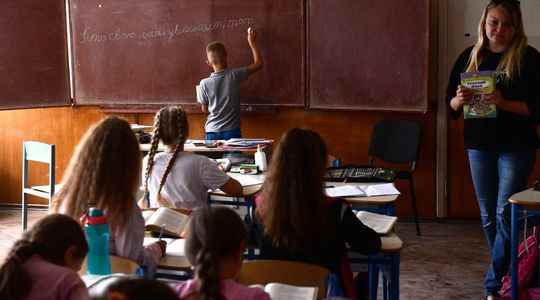While the guns fell silent in Russian-occupied Ukrainian territories, a new, quieter battle has begun. In the schools of the areas passed under the thumb of Moscow, the Russians intend to take over the entire education system. “The military and their collaborators are going around all the establishments to force Ukrainian teachers to switch to the Russian school curriculum, reports Iryna*, a university professor in the occupied region of Kherson, who recently fled to territory controlled by kyiv. The Russians have even already started bringing their textbooks.”
Moscow had announced the color in recent weeks. “It is very important to restore our ties and our traditions, because we have common roots”, declared in June the Russian Minister of Education, Sergei Kravtsov, before announcing, in stride, that the schools of the territories occupied “will switch to Russian standards from September 1”. The objective: to Russify, from an early age, the populations. “They are trying to make our children forget the Ukrainian language and history,” laments Khrystyna*, an extracurricular educator who lived for several months under Russian occupation before taking refuge in the Ukrainian zone.
“Pressures and Threats”
In a report published in early May, Cedos – a Ukrainian think tank specializing in education – already warned of the “significant pressure and threats” exerted by the occupation authorities on members of the teaching profession “so that they resume work and begin to teach in Russian and according to Russian standards and textbooks”. “Two pro-Russian rectors have been appointed to two universities in Kherson, abounds Iryna. Few people take them seriously, but everyone fears them because they are constantly accompanied by Russian soldiers armed with assault rifles.”
Faced with the reluctance of a large part of the educational body to apply these new programs, the authorities rely on Russian teachers transferred to the occupied territories. “In my establishment, the new management has brought in teachers from Chuvashia and Buryatia, two poor regions of Russia”, confirms Iryna. According to the NGO SOS Crimea, school principals on the Crimean peninsula – annexed by Moscow in 2014 – have also been instructed to draw up lists of teachers ready to come and teach in the occupied territories of southern Ukraine.
Moscow is not at its first attempt. “Under the Tsarist Empire or during the Soviet Union, Russia tried to Russify Ukraine in many ways, by imposing its culture or its language”, points out Galia Ackerman, historian specializing in the post-Soviet space. “There is no Ukrainian language, there never was and there cannot be one”, declared in 1863 the Minister of the Interior of Tsar Alexander II, in a circular prohibiting most publications in Ukrainian. In 1938, Stalin imposed the learning of Russian in all schools of the Soviet republics from the primary level, to consolidate national feeling.
A history revisited by Russia
“The Russians are not only trying to impose their language in schools in the occupied territories, they are also changing history lessons to match their version,” said Oleksandra Matviichuk, director of the Center for Civil Liberties in Ukraine. But they purposely omit crimes committed by the Soviet regime, such as the Holodomor, the great famine organized by Stalin in Ukraine in the 1930s.” A tragedy that would have caused the death of 3 to 5 million Ukrainians, according to historians.
This reformatting of young minds is part of a broader process of forced march Russification of the occupied territories. In May, pro-Russian authorities in the Kherson region said they would seek annexation to Russia “before the end of the year”. A simplified procedure has already been put in place in the spring to allow citizens of southern Ukraine to quickly obtain a Russian passport. At the same time, the ruble is gradually replacing the Ukrainian hryvnia. It even became the official currency in the Kherson region at the end of May. A month later, Putin’s army announced that it had connected the entire oblast to Russian television channels, now accessible “free of charge”.
“Without this propaganda, their whole war is in vain”, breathes Khrystyna. A hope despite everything: that the Ukrainian army – which launched a counter-offensive in the region at the beginning of the summer – manages to wrest Kherson from the hands of the Russians. “Everyone is waiting for the liberation of the region, slips the educator. As soon as she is no longer busy, I will go home.”
* The names have been changed.
